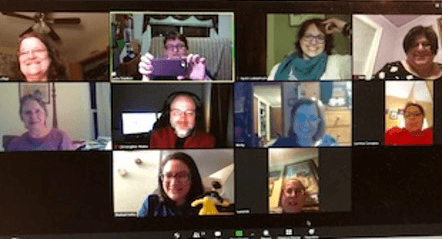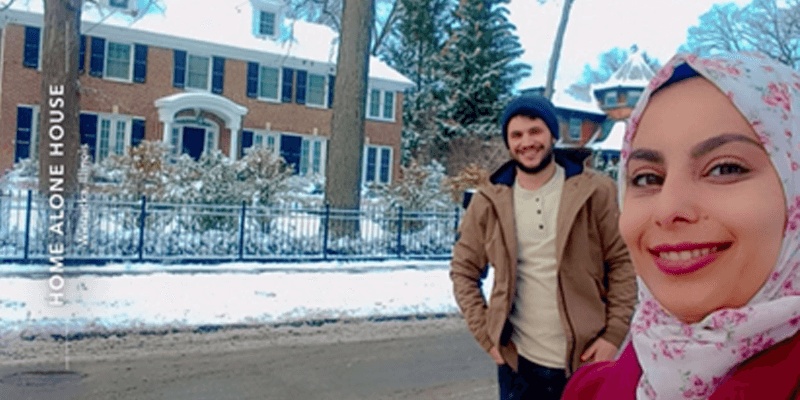Students have many options when pursuing a PhD degree, including varying plans of study, research mentors, cost, and time to degree. However, as the discipline of nursing continues to evolve, so does the process of engaging in research and scholarship. Advancing the profession of nursing successfully requires an increasing emphasis in collaborative engagement with colleagues in the conduct of research and scholarly dissemination. As the stewards of the discipline, nurse researchers must start their PhD program by working collaboratively with colleagues, and engaging as a community on their academic, research, and scholarly projects. UW-Milwaukee College of Nursing realized that for the PhD students to step forward as stewards of the discipline, we needed to start coming together and build a community of scholars – by increasing opportunities for engagement.
Julia Snethen, Professor and PhD in Nursing Program Director, envisioned several components of structured engagement to build a Community of Scholars. One of the initiatives for building the Community was the creation of the Special Topics Short Seminars. These monthly, virtual sessions were developed to enrich PhD students’ knowledge of research and scholarship by presenting content that will further strengthen students’ writing and analytic skills for conducting research. By offering the session virtually, on-campus and online cohorts can engage in dialogues with faculty members and each other.
Another element of the Community of Scholars program was a collaboration with the Eta Nu Chapter of Sigma Theta Tau International to develop a research and scholarship educational series. The opportunity to host established senior researchers and scholars, who share their experiences in conducting research and policy outcomes gives the students a worldwide perspective. Snethen shares, “It is a pleasure to welcome experts from all over the world to speak to our students and provide insights, lessons learned and share their cutting-edge research.”
One initiative that has structured the Community of Scholars has been the formation of informal weekly virtual meetings in the evening. The virtual meetings, termed “I Hope you Zoom” are an opportunity for students to gather, get to know each other, and develop relationships between on-campus and online groups. As this program of engagement has continued to evolve, students have taken over leadership roles in creating and facilitating weekly sessions. Dr. Snethen also sets up times to listen to students share insights, concerns, and questions regarding the PhD program. From these virtual meetings, multiple groups have been formed to collaborate on scholarly projects and presentations and form supportive friendships.

One of the most exciting elements of the Community of Scholars development is the evolution of the poster symposiums. Each semester, poster symposiums allow students to present their research and scholarship. Previously it was a challenge to get students to consider participating, now the symposiums are well attended, with students planning projects they will present throughout the year. The poster symposiums have become an opportunity for the students to shine as they demonstrate the academic strengths they have gained during the program.
Building relationships and community within the program, especially between doctoral students, isn’t always easy and generally a new process for most students. Students enter the program from different clinical backgrounds, experience levels, and lifestyles. UWM welcomes students from all over the world, and often, international students find our program engagement imperative to their transition to a new country.
Raghad Thaer Tawalbeh, PhD in Nursing student started at UWM in fall 2020 and isn’t one to sit still. She loves adventure and has taken advantage of her time at UWM. From day trips to more extended trips, she and her husband are finding ways to fill their time outside of the classroom. Raghad has captured her travels through her Instagram account and is sharing them with incoming students. She said, “The idea of sharing what I learned about Wisconsin and UWM came from my experiences as an international student. Many students starting the program were also international and didn’t have as many families and friends nearby. I now share what I’ve learned through looking at maps and finding values for other students.” Raghad now offers guidance to new students in the program by sharing her adventures and what is available. She shares UWM resources such as where to rent bikes, do yoga, go swimming, bowling, etc. She also shares places she has traveled to, including the Wisconsin Capital, famous custard stands, museums, and parks all around the area – including details on which days students get a free or reduced admission for many of these various Milwaukee activities.
What once started as a weekly gathering to connect students has evolved into a community that welcomes new students, provides mentorship, encourages connections, and keeps each other engaged in their journey to earning a PhD in Nursing. Snethen recently published an editorial in Nursing Outlook, “Sharing the value: The PhD degree in nursing,” which depicts not only the importance of the PhD in Nursing but also how UWM is leading the way in bringing students together to experience rich discussions on research and theory. UWM gives future scientists, nurse educators and academics opportunities to advance their learning experiences by building on the program’s foundation and sharing deeper learning opportunities, which ultimately prepares them for the real world beyond the classroom.
